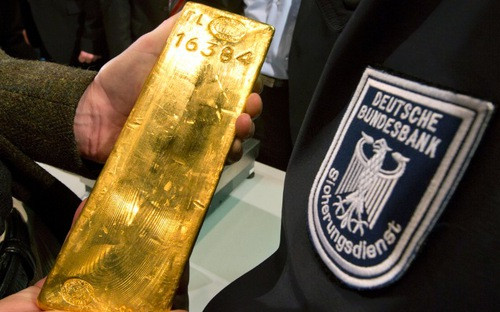Germany repatriates all $13 billion of gold reserves from the US
As of the end of 2016, Germany had nearly 3,378 tons of gold reserves, compared to nearly 8,134 tons of the US...
 |
| Germany is the country with the second largest gold reserves in the world, after the US - Photo: CNN Money. |
Germany's central bank has completed the transfer of $13 billion worth of gold bars from New York to Frankfurt, part of a plan to bring about half of the country's foreign gold reserves home.
According to CNN Money, Germany began transferring its gold reserves stored in New York and Paris back home in 2013. To date, 642 tons of gold have been transferred under this plan.
With the latest transfer, the Bundesbank transferred a total of 330 tons of gold that had been stored at the New York branch of the US Federal Reserve (FED). The gold was stored in an underground vault on Manhattan Island.
Bundesbank did not reveal the means or method by which the gold was transferred to Germany, but only said that the transfer of gold to the country was aimed at building trust.
Germany's plan to repatriate its gold will be completed when the country's last 100 tonnes of gold are moved from Paris.
Germany's repatriation of gold is seen as a recognition that times have changed: Germans no longer have to worry about keeping their national gold reserves safe from the dangers of the Cold War.
And the Bundesbank no longer has to store its gold in Paris as a safeguard that would allow Germany to quickly convert it into foreign currency in an emergency, since both Germany and France now use the common European currency, the euro.
After World War II, Germany gradually accumulated a huge gold reserve. As the German economy grew, the country used foreign currency earned from exports to buy gold and stored some of it in vaults abroad.
Fears of the Soviet Union kept Germany holding gold abroad even after the gold standard broke down.
In recent years, there have been many rumors and conspiracy theories in Germany about the country's gold reserves. Many people have questioned whether the national gold reserves stored abroad have been lost or degraded.
The issue has gradually emerged as a major political issue in Germany, prompting the German Federal Court of Auditors to request an inspection of the country's gold reserves stored abroad in 2012.
The Bundesbank has spoken out on the issue, saying it receives annual updates from the central banks of the countries where Germany holds its gold reserves. The Bundesbank said “the integrity, credibility, and security of Germany’s foreign gold reserves are not in question.”
However, in 2013, the Bundesbank announced that it would transfer half of its foreign gold reserves to Frankfurt. Germany will continue to hold some of its gold reserves in London and New York, where they can be quickly converted into pounds or dollars in the event of an economic emergency.
Germany is the country with the second largest gold reserves in the world, after the United States. According to the latest data from the World Gold Council (WGC), as of the end of 2016, Germany had nearly 3,378 tons of gold reserves, compared to nearly 8,134 tons of the United States.
According to Vneconomy

.jpg)




.jpg)

